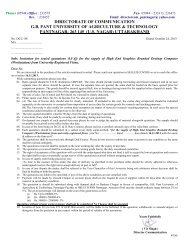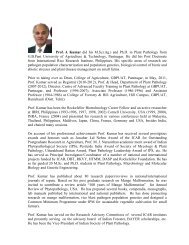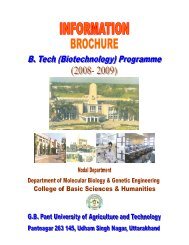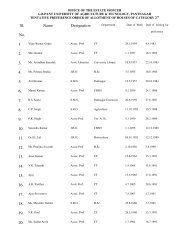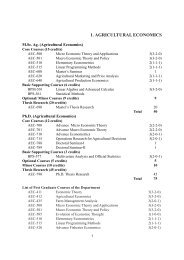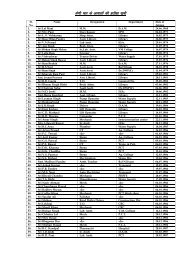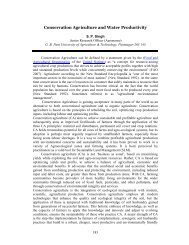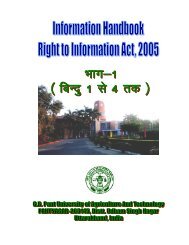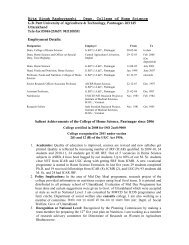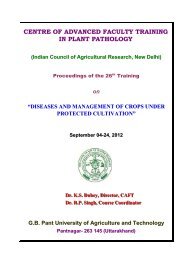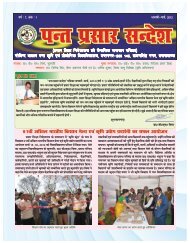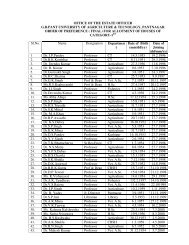Seed Health Management for Better Productivity - Govind Ballabh ...
Seed Health Management for Better Productivity - Govind Ballabh ...
Seed Health Management for Better Productivity - Govind Ballabh ...
You also want an ePaper? Increase the reach of your titles
YUMPU automatically turns print PDFs into web optimized ePapers that Google loves.
(<strong>Seed</strong> <strong>Health</strong> <strong>Management</strong> <strong>for</strong> <strong>Better</strong> <strong>Productivity</strong>)Application of DNA Techniques in <strong>Seed</strong> IndustryS. MarlaDepartment of MBGE, CBSH, G.B.P.U.A.&T., Pantnagar-263145 (Uttarakhand)The valuable contribution of seed industry in bringing high quality seeds of elite varieties &hybrids of various crops to the fields of Indian farmers and making green revolution successful andsustainable is highly appreciative. However with changing times there is a necessity to adopt newtechnologies to improve productivity in farmers fields. Emergence of DNA based techniques suchas Molecular biology, genomics, proteomics and Bioin<strong>for</strong>matics has contributed to betterunderstanding of basic mechanisms of crop growth and yield improvement and with potentiallydirect applications in seed industry. Today several molecular biology based DNA techniques <strong>for</strong>easy identification of crop varieties/hybrids, identification & isolation of genes responsible <strong>for</strong>agronomically important traits such as high grain yields, nutritional quality, resistance to diseases& pests, drought etc. transgenic Cotton and rice plants with introduced pet & disease resistanceare an example of the success story.We shall limit in this article on How DNA techniques can potentially benefit seed industry.One of the prime mandates of seed production is mainteneance of seed purity starting fromnuclear seed to foundation seed Produced. Identification different crop varieties and hybrids witheasy to use simple techniques is the need of the hour. It is not always possible to identify a truetype of seed using field, morphological or biochemical techniques as there are not manyphenotypic markers available. Where as the existing differences among genotypes at geen levelusing DNA techniques can record variations (polymorphisms) fully with out loss and influence ofenvironment. The DNA based techniques are cheap, efficient and much faster without having towait <strong>for</strong> the data recorded from raised adult plants in the field. Several scorable molecular (gene)markers are now available (some linked to phenotypic traits such as seed color and shape) thatare being employed <strong>for</strong> true type seed identification, detection of diseased seed lots or presenceor absence of gene of our interest in the examined seed sample. Plant breeders can employthese techniques to monitor flow of desirable parental geens across the segregating populationas.The seed industry has already started using some of these techniques to true hybriditytesting or identification of an original variety. With increased theft of elite seed by some of thespurious industry competitors, the DNA techniques are increasingly being accepted by Police andJudiciary in conflict resolution as a valid proof.The polymorphism which exists in different DNA sequences of crop varieties can bestudied by following either PCR based approaches or non PCR based approaches.What is PCr (Polymerase Chain reaction) of DNA:.The existing polymorphism among analysed varieties can be recorded at the level of DNAemploying molecular biology techniques- Polymerase Chain reaction (PCR) and Electrophoresis.The variations (polymorphism) in DNA can be separated based on their nucleotide sizes and- 173 -



